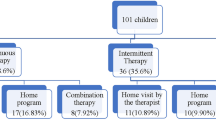Abstract
Objectives
To investigate parental knowledge of cerebral palsy, and to evaluate the impact of an educational intervention on it.
Methods
From May 2003 to April 2004, 26 parents of newly diagnosed children with cerebral palsy were interviewed. After the interview, each parent was administered a structured educational program and re-interviewed after three months. The pre and post intervention responses were compared using Chi-square test.
Results
After the intervention, there was a significant improvement in parental knowledge: (i) of the cause of the disorder (5/26 vs 20/26, P = 0.0001), (ii) that it is non-progressive (16/26 vs 24/26, P = 0.021), (iii) that it is not curable (10/26 vs 23/26, P = 0.0005), (iv) that it is treatable (12/26 vs 24/26, P=0.0009), (v) of the frequency and duration of therapy necessary to improve functional abilities (7/26 vs 17/26, P = 0.005), and, (vi) of the importance of following up regularly with a pediatrician (17/26 vs 26/26, P = 0.003). However, there was no significant improvement in parental knowledge: (i) of the meaning of the term ‘cerebral palsy’ (0/26 vs 5/26, P = 0.060), (ii) that ‘early intervention therapy’ given by a team of therapists is its recommended therapy (18/26 v 23/26, P = 0.174), (iii) of the meaning of the term ‘early intervention therapy’ (12/26 vs 17/26, P = 0.163), and (iv) that it is preventable with good medical care (8/26 vs 10/26, P = 0.560).
Conclusion
Parental knowledge of cerebral palsy is inadequate. A single-session educational program can significantly improve parental knowledge about many ‘core basic issues’ regarding cerebral palsy.
Similar content being viewed by others
References
Eicher PS, Batshaw ML. Cerebral palsy. Pediatr Clin North Am 1993; 40: 537–551.
Rosenbaum P. Cerebral palsy: what parents and doctors want to know. BMJ 2003; 326: 970–974.
Murphy N, Such-Neibar T. Cerebral palsy diagnosis and management: the state of the art. Curr Probl Pediatr Adolesc Health Care 2003; 33: 146–169.
Ashwal S, Russman BS, Blasco PA et al. Practice parameter: diagnostic assessment of the child with cerebral palsy: report of the Quality Standards Subcommittee of the American Academy of Neurology and the Practice Committee of the Child Neurology Society. Neurology 2004; 62: 851–863.
Suvanand S, Kapoor SK, Reddaiah VP, Singh U, Sundaram KR. Risk factors for cerebral palsy. Indian J Pediatr 1997; 64: 677–685.
Singhi PD, Ray M, Suri G. Clinical spectrum of cerebral palsy in north India—an analysis of 1,000 cases. J Trop Pediatr 2002; 48: 162–166.
Guralnick MJ. Effectiveness of early intervention for vulnerable children: a developmental perspective. Am J Ment Retard 1998; 102: 319–345
Bailey DB, Aytch LS, Odom SL, Symons F, Wolery M. Early intervention as we know it. Ment Retard Dev Dis Res Rev 1999; 5: 11–20.
Anderson LM, Shinn C, Fullilove MT et al. The effectiveness of early childhood development programs. A systematic review. Am J Prev Med 2003; 24(Suppl 3): S32–S46.
Malin AJ. Indian adaptation of the Vineland Social Maturity Scale. Ist ed. Lucknow; Indian Psychological Corporation, 1971.
Kamat VV, ed. Measuring intelligence of Indian children, 4th ed. Bombay; Oxford University Press, 1967.
Kuppuswamy B. Manual of socioeconomic status (urban), 2nd ed. Delhi: Manasayan, 1981.
Mishra D, Singh HP. Kuppuswamy’s socioeconomic status scale-a revision. Indian J Pediatr 2003; 70: 273–274.
Hagberg B, Hagberg G, Olow I, von Wendt L. The changing panorama of cerebral palsy in Sweden. V. The birth year period 1979–82. Acta Paediatr Scand 1989; 78: 283–290.
Singhi PD. Cerebral palsy-management. Indian J Pediatr 2004; 71: 635–639.
Kant L, Dewan S. Parents’ knowledge about cerebral palsy. Indian Pediatr 1983; 20: 875–876.
Kaur P, Chavan BS, Lata S et al. Early intervention in developmental delay. Indian J Pediatr 2006; 73: 405–408.
Bairg, McConacbie H, Scrutton D. Parents perception of disclosure of the diagnosis of cerebral palsy arch. Dis Child 2000; 83: 475–480.
Author information
Authors and Affiliations
Corresponding author
Rights and permissions
About this article
Cite this article
Karande, S., Patil, S. & Kulkarni, M. Impact of an educational program on parental knowledge of cerebral palsy. Indian J Pediatr 75, 901–906 (2008). https://doi.org/10.1007/s12098-008-0160-0
Received:
Accepted:
Published:
Issue Date:
DOI: https://doi.org/10.1007/s12098-008-0160-0




